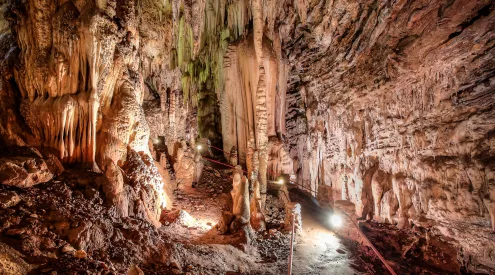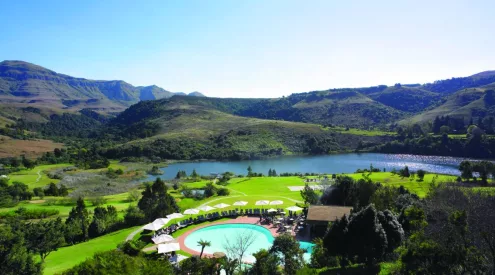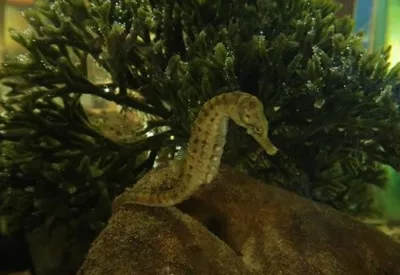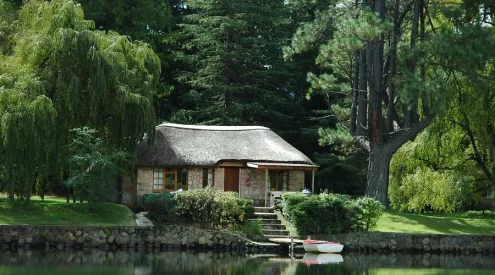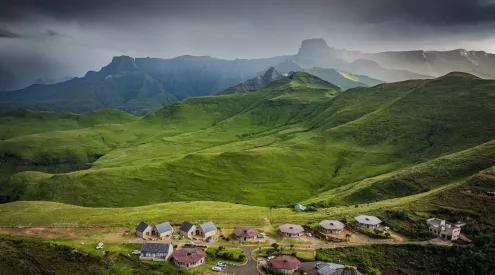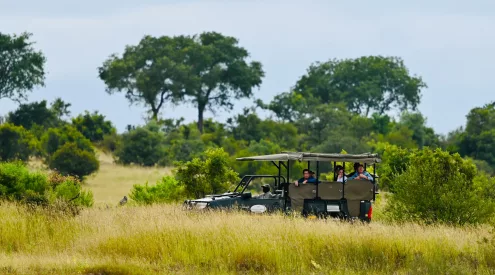Although statistics of rhino poaching have almost halved during the COVID-19 pandemic lockdown, Magic Hills Game Reserve urges the country’s public and private reserves not to become complacent about protecting these critically endangered animals.
With the international borders speculated to open soon, and the value of rhino horn rising due to the long-term gap in availability, poaching may skyrocket in the months to come. Combined with the deepening poverty caused by lockdown, poaching syndicates will have no trouble in finding willing men from rural communities to poach rhino and brutally deface them.

A mother and calf black rhino in Kenya.
The Magic Hills Private Collection is a portfolio of luxury and wild experiential properties that target local and international travellers seeking a Big Five safari destination in a unique and natural setting. As with many other private and national game reserves, Magic Hills Game Reserve funds its conservation efforts using the proceeds of running its hospitality establishments.
With the local and international tourism industry grinding to a halt during the pandemic, so has the funding required to continue conservation on the reserve – a challenge being faced across the country. To raise the funds needed to confront the inevitable surge in rhino poaching, Magic Hills has launched a crowdfunding campaign.
To fight back fully prepared, Magic Hills will need funding for:
– The hiring of sufficient staff on the ground to track the rhino daily and monitor their movements, their state of wellness, and keep count of rhinos and their young. This amounts to eight field rangers at R 12 000 each per month each, and two team leaders at R20 000 each per month = R1 620 000 per annum
– Kitting those staff with uniform, boots, protective gear and warm clothing during cold months and night rounds. The currently accepted estimate for basic kit costs is R 4 200 per ranger. Advanced kit include binoculars, radio communication devices, firearms, and full training costs R50 000 per ranger = R432 000
– Funding the fuel and the vehicle maintenance costs, in order to traverse the 20 100 hectares of rocky, mountainous reserve land. Operating two Land Cruisers (costing R650 000 each), R82 000 per year for fuel costs, R12 000 per year for services and minor repairs, and R15k 000 per year to replace tyres = R1.518 million in year one, R218 000 per year thereafter
– To contribute to the funding of future purchase and transportation of black rhino for the breeding of new generations = R350 000 per rhino
– To fund darting and veterinary exercises, where rhinos need care. At R15 000 per hour for helicopter time, R2 000 for vet time, and R1 500 – R 3000 for treatment = approximately R20 000 per rhino
– To contribute to long-term plans to incorporate further technology into the tracking and care for rhino, such as telemetry systems. These amounts can climb as high as R50 000 per ankle collar, and R150 000 to set up a full LoRa WAN with RFID receivers at waterholes.
– The rewilding of the reserve, much of which has suffered overgrazing for over a century. By facilitating the regrowth of the area’s natural biomes, they provide rhinos ample space to hide, eat well, and reproduce. Every cent helps toward regreening the landscape at R 7000 to R 15 000 per hectare, as well purchasing more land at the current price of R 3 000 to R5 000 per hectare.
Speaking of the unusual quiet in poaching during the COVID lockdown, Magic Hills General Manager, Declan Hofmeyr describes the time as a ‘quiet before the storm’, saying: ‘A surge is expected. Just like the rest of South Africa, the syndicates and shooters were locked down by the pandemic, but they still have orders to fill and we were already seeing persons of interest moving between provinces at Level 2 of lockdown. As international travel now begins to reopen, it will likely go back to the pre-COVID threat level.’
Hofmeyr goes on to say that private reserves and organizations have to take the stand against poaching, largely without state assistance: ‘Since there is no national plan or regulated standard to ensure protection, it comes down to the individual reserve to consider a whole basketfull of variables in determining the amount of effort they put into area integrity and the protection of their rhino.’
Watch the informational video:
Without the support of the public, many anti-poaching organizations, and game reserves like Magic Hills, are limited in the amount of care and protection that they can provide their rhinos. The public is urged to get involved, by financially supporting a reputable reserve or anti-poaching organization, and to report suspicious activity to the senior authority, by calling +2771 348 8630.
Protect South Africa’s black rhino population – please donate here. https://www.backabuddy.co.za/champion/project/unique-horn-project
Picture: Unsplash




